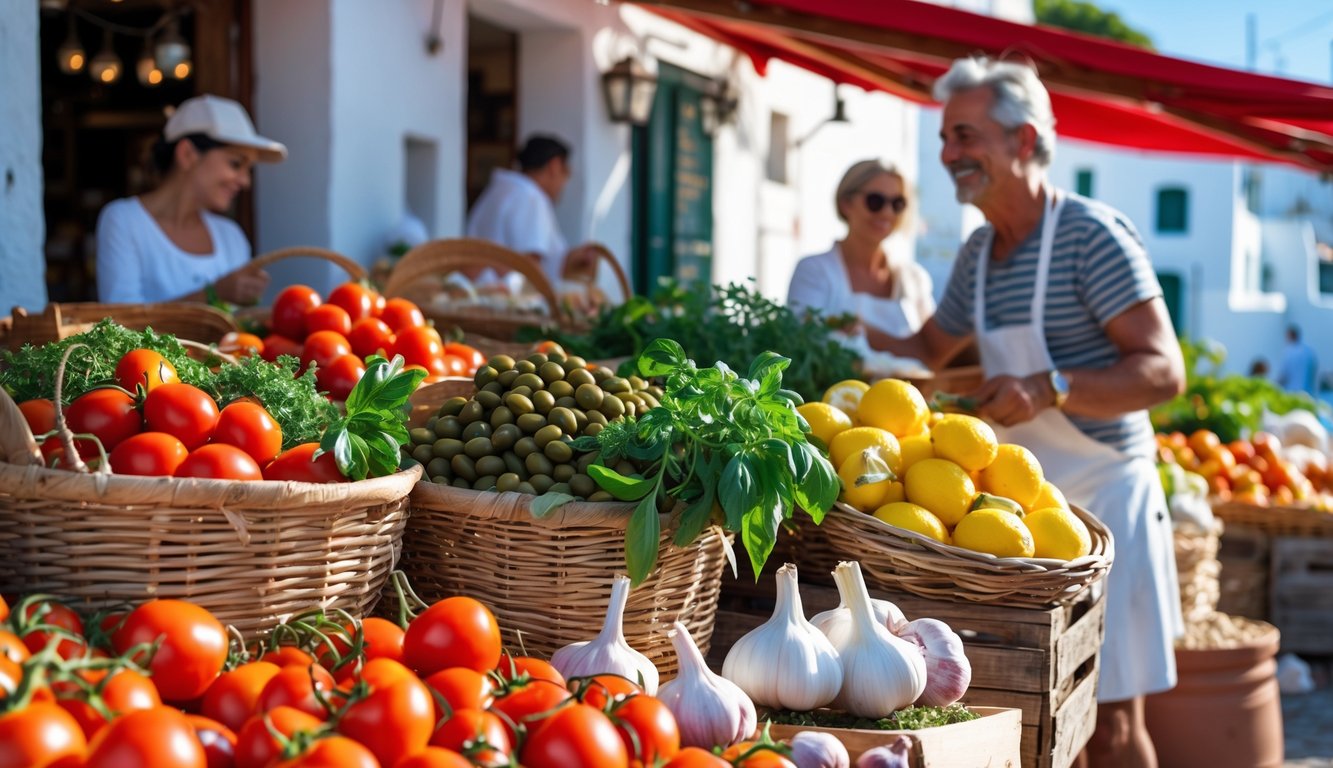
From Land and Sea: Proteins in Mediterranean Dishes
Nobody prepares you for the endless debates about whole fish vs. fillets. Watching a local grandmother clean a bream is a whole event. Here, protein isn’t just some nutrition label nonsense. The seafood’s almost alive at the market, and every region claims their lamb or chickpea stew is “the real one.” Ignore the health blogs—locals care about who raised the lamb or whether the beans are “old” (whatever that means).
Seafood Essentials Locals Love
First time I saw sea bass stacked on ice at the port, I wondered who actually eats anchovies for breakfast. Apparently, half the town. Sardines hit the grill, heads on, and disappear in seconds at every festival. Nobody outside seems to get how normal anchovies on toast are.
Local pride is off the charts. A fisherman once told me the Mediterranean produces over 3 million metric tons of seafood a year, but “ours tastes better because of the currents.” (He cited some study I never found.) Octopus? They bash it with a bottle, toss it in oil, and chew without complaint. “Fresh” doesn’t mean what supermarkets think—if it doesn’t glare back at you, it’s not fresh.
Raw shrimp, grilled mackerel, steamed mussels—variety’s not optional, but prep is always minimal. Salt, lemon, heat. That’s it. And if you forget to scale a fish, you’ll never live it down.
The Importance of Lean Meats
Nobody in southern Italy or coastal Spain eats red meat every day. Why bother, when roast chicken marinated overnight tastes better cold than most restaurant meals? Nutritionists love “lean proteins,” but the real test is whether your butcher knows your family. Chicken and turkey might sound boring, but people here swear less fat means bigger portions. Portion sizes? Irrelevant—my neighbor’s grandma never measured a thing and outlived every diet fad. Supposedly, grilled chicken breast has 25g protein per 100g, but good luck finding two people who agree on how to cook it.
Oven times? Forget it. Locals poke meat with a finger and call it done. Lamb is practically a religious experience—try souvlaki on a Greek ferry, then talk to me about bland rotisserie meats. Red meat’s a treat, and only if it smells “right.” Whatever that means.
Legumes and Plant-Based Proteins
Leftovers? I’d eat those stewed lentils from Alexandria every day if I could. Chickpeas (garbanzo beans, if we’re being formal) are cheap, so some people call them “peasant food,” but everyone secretly fights for the last scoop of hummus. Makes no sense to mock what everyone’s proud of.
Black-eyed peas, fava beans—every market has bins of dried legumes. A bakery owner once told me old chickpeas cook faster “if you curse at them.” Not sure if she was serious, but I tried it anyway. Lentils have 9g protein per 100g cooked, according to the Mediterranean Diet Foundation, so they were a thing way before plant-based diets became a brand. Legumes fit everywhere—cold salads, hot stews, mashed on bread. Mess up soaking, though, and you’re eating alone.
Dairy Delights: Cheeses and Yogurt
Feta’s missing from my lunch again—always is when I forget which market sells the crumbly, salty stuff from the islands and not the bland shrink-wrapped blocks. Yogurt’s another battleground: thick, tangy, a must-have, but most people grab sweetened tubs and wonder why their tzatziki never tastes right.
Regional Cheeses and Their Stories
Let’s get this out of the way: I’m not here to list every cheese between Mykonos and Málaga. That would take years and I’d probably get distracted by olives anyway. But honestly, why does nobody ever mention that weirdly bulletproof kefalotyri—sheep’s milk, nutty, just sitting there on my grandma’s counter for months, and it never molds. Is that normal? I don’t know. People act like feta’s just bland, salty cubes—nope. The real feta comes in barrels, floating in brine, so sharp it’ll jolt you awake faster than that double espresso you keep pretending you don’t need. Naples? I watched some guy—probably a mozzarella wizard—drop still-warm cheese balls straight into plastic bags. “Never fridge it, ever, or you kill the soul,” he said. I ignored him and tried to freeze a dozen for the flight home. Disaster. Don’t do it.
There’s soft cheese, hard cheese, cheese that’s technically illegal in three countries because it tastes like grass and barn. My friend once smuggled an entire suitcase of Bulgarian kashkaval because “it tastes like their actual cows and nothing else.” If you want to know why it tastes different, just ask a vendor. Good luck getting a straight answer. Usually it’s “the grass” or a shrug. I still don’t get why tourists settle for those sad supermarket “Mediterranean blends” when regional cheeses have stories rooted in centuries-old traditions and intense craftsmanship. But hey, maybe nobody wants to risk their backpack smelling like a dairy farm for the rest of the trip.
Yogurt Traditions and Tzatziki
Tzatziki. Everyone’s got a “real recipe.” I’ve lost count of the times I’ve eaten some and then smelled like garlic for three days. Mediterranean yogurt? It’s not some dessert cup—it’s thick, sometimes almost cheese, and if you’re in the Balkans, it’s thin, pourable, tart, and basically milk that got left out on purpose. I asked a Greek grocer why his yogurt made my lips pucker. He just shrugged: “Our cows know secrets from the mountain.” What does that even mean? I have no idea. But I can’t prove him wrong.
Dairy like yogurt is everywhere—breakfast, lunch, sauce, whatever. People toss cucumbers in and call it tzatziki, but the real deal? It’s strained for hours. You might mistake it for cheese if you’re not paying attention. Supposedly, according to WynterWellness or whoever, all this probiotic stuff is great for your gut, but honestly, I forget that every time I eat half a bowl with lamb. Finding real Mediterranean yogurt outside the region? Good luck. You’ll probably have to beg an aunt for her starter culture or find a deli that doesn’t advertise on Instagram. Mediterranean yogurts and their iconic use in dishes like tzatziki boast flavors and textures no mass-produced cup ever nails. And yeah, apparently adding vinegar is cheating. Don’t ask me why.



